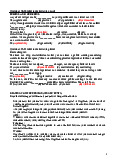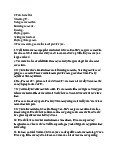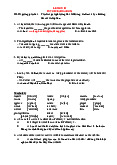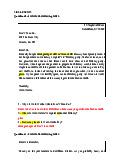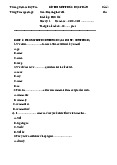



Preview text:
ASSIGNMENT CHAPTER 5 GOD IS NOT ONE STEPHEN PROTHERO Assignment Week 5:
Please refer to instructions in this week's Module and follow them.
Things to avoid in your WRs.
1. Thesis statements that contain phrases like, "I really enjoyed", "My favorite thing" are not
thesis statements. You would want to say, "What I agree with" or "I strongly disagree with" to
construct a strong thesis statement, or similar phrases that indicate a definite point of view.
THERE IS ONLY ONE THESIS STATEMENT CONSISTING OF ONE SENTENCE.
2. Avoid faith claims. We are engaged in the academic study of religious traditions which requires objectivity. W
eek 5: Confucianism: Religion or Social Constructionism?
1. Reading for this week is Confucianism: The Way of Propriety pgs. 101-130, Stephen Prothero
and pgs. 111-113 Introduction to Confucianism pgs. 119-131 (sections 6-13) Novak.
2. Avoid summaries and give me well written persuasive offerings as you have been.
3. Refer to the links of writing strong thesis statements. That is still mission one.
4. Please underline your thesis statement and provide a word count for your WRs.
Tips on Writing a Persuasive Essay 1. Choose a position.
2. Express that opinion in a thesis statement.
3. Create an outline of your argument.
4. You can describe opposing views and then refute with supporting evidence
5. Consider various ways to make your argument. (Analogy, Comparisons.) 6. Write a 1st draft.
7. Get your thoughts down in clear sentences. (Spelling, punctuation, subject/tense
agreement, avoid colloquial expressions)
8. Evaluate and perhaps rewrite your thesis statement. 9. Write a 2 draft. nd
10. Revise and reorganize to present your argument in a logical flow.
11. READ IT OUT LOUD TO YOURSELF
If you’re stuck on your thesis statement, email me and we will work on it.
Weekly Responses: There will be 9 Weekly Responses (dates below in Course Summary) These
should contain a reaction to the material you have read that week. What stood out to you? What
did you learn that you did not know before and how does it impact your understanding of that
particular religious tradition? What do you agree with and why. What do you disagree with and
why. These are short 150-200-word responses. Be clear, concise, and present your ideas in a
logical flow. I strongly suggest that you write a draft and then edit that draft. That is key to great
writing. You will improve as the semester progresses. Trust me. Weekly Responses will be
available for you to upload all week and will close on Sunday evenings at 11:59. Late responses
will not be accepted except for circumstances that are properly documented. See Late Submission Policy.
How to Write a Strong Thesis Statement
A thesis can be found in many places—a debate speech, a lawyer’s closing argument, even an
advertisement. But the most common place for a thesis statement (and probably why you’re
reading this article) is in an essay.
Whether you’re writing an argumentative paper, an informative essay, or a compare/contrast
statement, you need a thesis. Without a thesis, your argument falls flat and your information is
unfocused. Since a thesis is so important, it’s probably a good idea to look at some tips on how to put together a strong one.
What is a “thesis statement” anyway?
You may have heard of something called a “thesis.” It’s what seniors commonly refer to as their
final paper before graduation. That’s not what we’re talking about here. That type of thesis is a
long, well-written paper that takes years to piece together.
Instead, we’re talking about a single sentence that ties together the main idea of any
argument. In the context of student essays, it’s a statement that summarizes your topic and
declares your position on it. This sentence can tell a reader whether your essay is something they want to read.
2 Categories of Thesis Statements: Informative and Persuasive
Just as there are different types of essays, there are different types of thesis statements. The thesis should match the essay.
For example, with an informative essay, you should compose an informative thesis (rather than
argumentative). You want to declare your intentions in this essay and guide the reader to the conclusion that you reach. Example:
To make a peanut butter and jelly sandwich, you must procure the ingredients, find a knife, and spread the condiments.
This thesis showed the reader the topic (a type of sandwich) and the direction the essay will take
(describing how the sandwich is made).
Most other types of essays, whether compare/contrast, argumentative, or narrative, have thesis
statements that take a position and argue it. In other words, unless your purpose is simply to
inform, your thesis is considered persuasive. A persuasive thesis usually contains an opinion and
the reason why your opinion is true. Example:
Peanut butter and jelly sandwiches are the best type of sandwich because they are versatile, easy to make, and taste good.
In this persuasive thesis statement, you see that I state my opinion (the best type of sandwich),
which means I have chosen a stance. Next, I explain that my opinion is correct with several key
reasons. This persuasive type of thesis can be used in any essay that contains the writer’s
opinion, including, as I mentioned above, compare/contrast essays, narrative essays, and so on.
2 Styles of Thesis Statements
Just as there are two different types of thesis statements (informative and persuasive), there are two basic styles you can use.
The first style uses a list of two or more points. This style of thesis is perfect for a brief essay
that contains only two or three body paragraphs. This basic five-paragraph essay is typical of
middle and high school assignments. Example:
C.S. Lewis’s Chronicles of Narnia series is one of the richest works of the 20th century because
it offers an escape from reality, teaches readers to have faith even when they don’t understand,
and contains a host of vibrant characters.
In the above persuasive thesis, you can see my opinion about followed by three clear Narnia
reasons. This thesis is perfect for setting up a tidy five-paragraph essay.
In college, five paragraph essays become few and far between as essay length gets longer. Can
you imagine having only five paragraphs in a six-page paper? For a longer essay, you need a
thesis statement that is more versatile. Instead of listing two or three distinct points, a thesis can
list one overarching point that all body paragraphs tie into. Example:
Good vs. evil is the main theme of Lewis’s
series, as is made clear through the struggles Narnia
the main characters face in each book.
In this thesis, I have made a claim about the theme in followed by my reasoning. Narnia The
broader scope of this thesis allows me to write about each of the series’ seven novels. I am no
longer limited in how many body paragraphs I can logically use.
Formula for a Strong Argumentative Thesis
One thing I find that is helpful for students is having a clear template. While students rarely end
up with a thesis that follows this exact wording, the following template creates a good starting point:
___________ is true because of ___________, ___________, and ___________.
Conversely, the formula for a thesis with only one point might follow this template:
___________________ is true because of _____________________.
Students usually end up using different terminology than simply “because,” but having a
template is always helpful to get the creative juices flowing.
The Qualities of a Solid Thesis Statement
When composing a thesis, you must consider not only the format, but other qualities like length,
position in the essay, and how strong the argument is.
Length: A thesis statement can be short or long, depending on how many points it mentions.
Typically, however, it is only one concise sentence. It does contain at least two clauses, usually
an independent clause (the opinion) and a dependent clause (the reasons). You probably should
aim for a single sentence that is at least two lines, or about 30 to 40 words long.
Position: A thesis statement always belongs at the beginning of an essay. This is because it is a
sentence that tells the reader what the writer is going to discuss. Teachers will have different
preferences for the precise location of the thesis, but a good rule of thumb is in the introduction
paragraph, within the last two or three sentences.
Strength: Finally, for a persuasive thesis to be strong, it needs to be arguable. This means that
the statement is not obvious, and it is not something that everyone agrees is true. Example of weak thesis:
Peanut butter and jelly sandwiches are easy to make because it just takes three ingredients.
Most people would agree that PB&J is one of the easiest sandwiches in the American lunch repertoire.
Example of a stronger thesis:
Peanut butter and jelly sandwiches are fun to eat because they always slide around.
This is more arguable because there are plenty of folks who might think a PB&J is messy or slimy rather than fun.
Composing a thesis statement does take a bit more thought than many other parts of an essay.
However, because a thesis statement can contain an entire argument in just a few words, it is
worth taking the extra time to compose this sentence. It can direct your research and your
argument so that your essay is tight, focused, and makes readers think. : thesis
